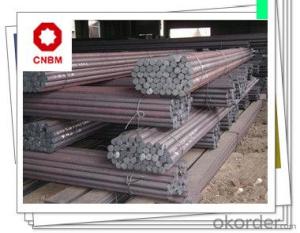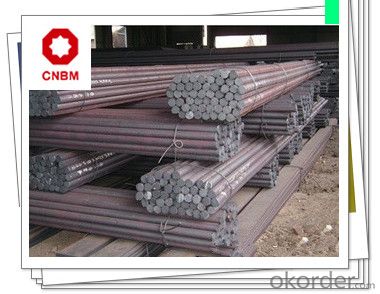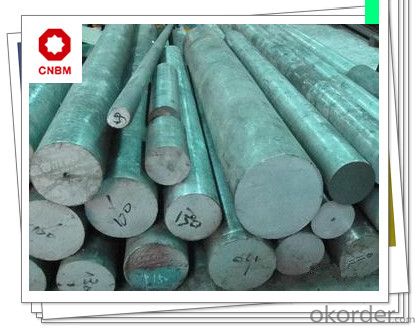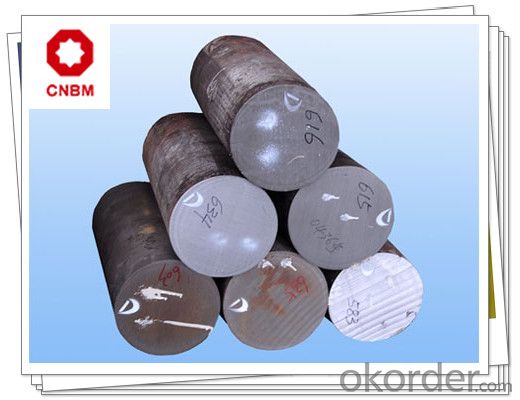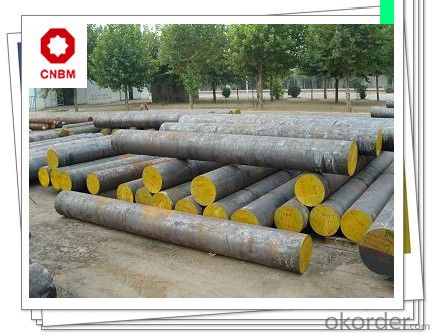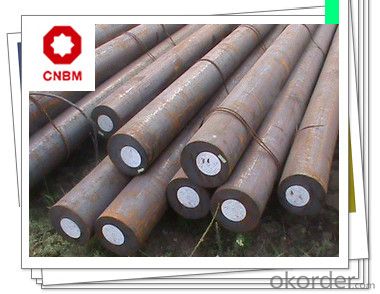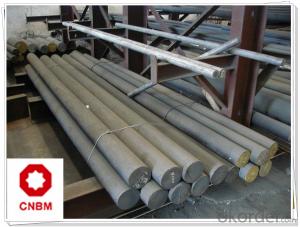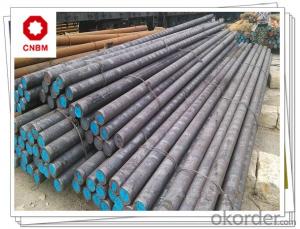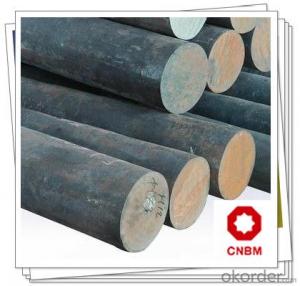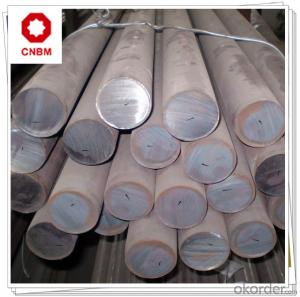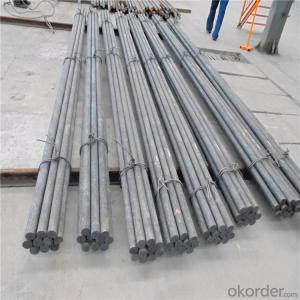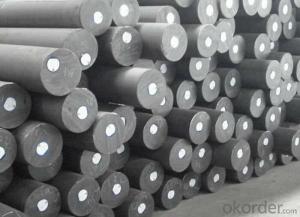Hot Rolled Carbon Steel Round Bars S40C
- Loading Port:
- Shanghai
- Payment Terms:
- TT OR LC
- Min Order Qty:
- 50 m.t.
- Supply Capability:
- 120000 m.t./month
OKorder Service Pledge
OKorder Financial Service
You Might Also Like
Hot Rolled Carbon Steel Round Bars S40C
Product Specification
1, Chemical Composition %
| Grade | C | Si | Mn | S | P | Cr | Ni | Cu |
| S40C | 0.37-0.44 | 0.17-0.37 | 0.50-0.80 | ≤0.030 | ≤0.030 | ≤0.20 | ≤0.25 | ≤0.25 |
2, Mechanical Properties
| Strength of Extension σb | Yield Strength σs | Reduction of Area ψ | impact absorbing energy |
| ≥570 Mpa | ≥335 Mpa | ≥45% | ≥47 Aku2/J |
3, Diameter: 16mm - 300mm
Length: Max 12m
Application
Used to produce axis shaft, transmission shaft, piston rod, connecting rod, chain wheel, wheel gear, etc.
Product Main Points
1, Heat Treatment: normalizing, annealing, tempering, quenching
2, Surface Treatment: black, grinding, bright, polish
3, Product Process: hot rolled, cold drawn, forged
FAQ
1, Payment Terms:
30% T/T deposit & 70% T/T before delivery.
Irrevocable L/C at sight
2, Trade Terms:
EXW, FOB, CIF, CNF
3, Delivery Time:
Normally 30-40 days. According to quantity.
4, Manufacture or Trading Company:
CNBM is a state-owned fortune global 500 trading company. We have intergrated supply system.
There are about 20 overseas locations in different countries.
Product Show
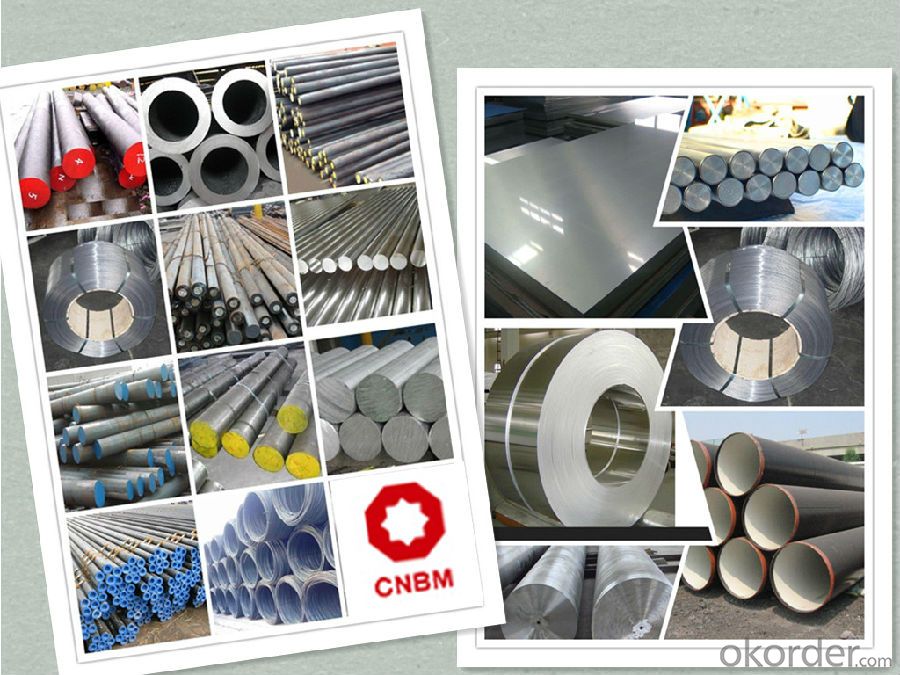
Work Shop
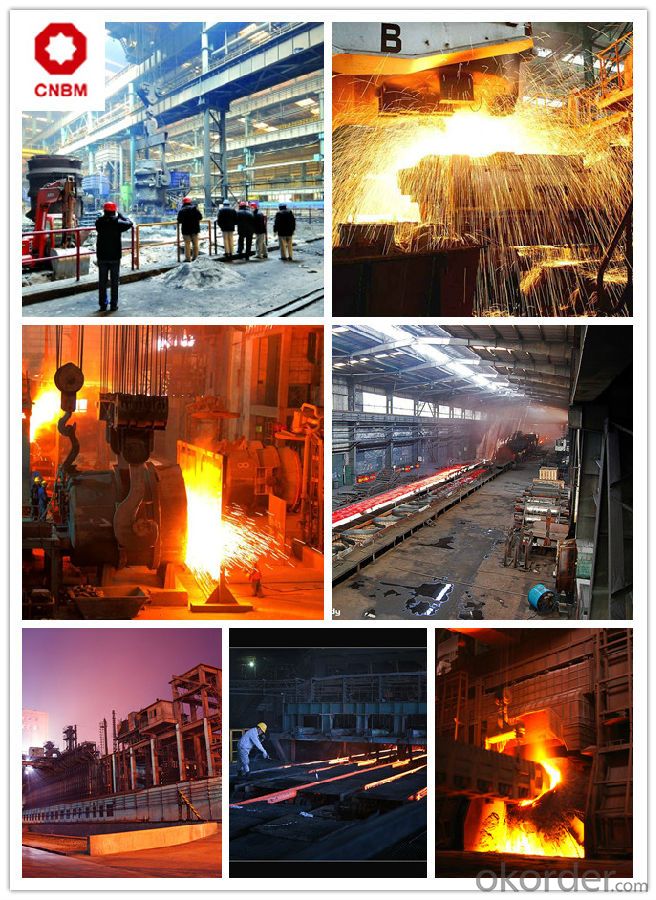
About Us


- Q: What are the scientific names of round bar and screw steel?
- Round steel: round steel refers to the cross section of round solid steel. Mainly used in manufacturing machine, stainless steel round bar, mechanical parts, seamless steel pipe blank
- Q: What are the different types of steel round bar surface finishes for corrosion resistance?
- There are several different types of steel round bar surface finishes that are commonly used for corrosion resistance. These finishes provide a protective coating on the surface of the bar, preventing contact with corrosive elements and reducing the risk of rusting or degradation over time. One of the most popular finishes for corrosion resistance is hot-dip galvanizing. This involves immersing the steel round bar in a bath of molten zinc, which forms a layer of zinc coating on the surface. The zinc acts as a sacrificial anode, corroding before the steel does, and providing long-lasting protection against rust and corrosion. Another common surface finish for corrosion resistance is stainless steel. This type of steel contains a minimum of 10.5% chromium, which forms a passive oxide layer on the surface when exposed to oxygen. This layer acts as a barrier, preventing further oxidation and corrosion, making stainless steel round bars highly resistant to rust and other forms of corrosion. Electroplating is another method used to provide corrosion resistance to steel round bars. This process involves immersing the bar in an electrolyte solution and passing an electric current through it. This causes a layer of metal, such as zinc or nickel, to be deposited onto the surface of the bar, providing a protective coating. Powder coating is a popular choice for steel round bars that require both corrosion resistance and aesthetic appeal. This process involves applying a dry powder coating to the surface of the bar and then curing it under heat. The powder melts and forms a hard, durable finish that provides excellent corrosion resistance while also offering a wide range of color options. Additionally, there are specialized coatings available for specific applications, such as epoxy coatings or polymer coatings. These coatings are designed to provide superior resistance to certain corrosive environments, such as exposure to chemicals or high humidity. In summary, the different types of steel round bar surface finishes for corrosion resistance include hot-dip galvanizing, stainless steel, electroplating, powder coating, and specialized coatings. Each of these finishes offers varying levels of protection against rust and corrosion, and the choice of finish depends on factors such as the specific application, environmental conditions, and desired aesthetics.
- Q: What are the different types of steel round bar machining processes?
- There exist various steel round bar machining processes, each with distinct characteristics and applications. Some of the most prevalent types are as follows: 1. Turning: By rotating the steel round bar against a cutting tool, material is removed to achieve the desired shape. Turning is frequently employed to create cylindrical shapes or eliminate excess material from the surface. 2. Drilling: This machining process involves the creation of holes in the steel round bar using a rotating cutting tool. Drilling is commonly utilized to generate holes for bolts or other fasteners. 3. Milling: A versatile machining process, milling entails the removal of material from the surface of the steel round bar using a rotating cutting tool. This technique can be employed to fashion intricate shapes, slots, or grooves. 4. Grinding: Material is removed from the surface of the steel round bar using an abrasive wheel in the grinding process. It is often employed to achieve a smooth finish or eliminate imperfections on the surface. 5. Boring: Boring enlarges an existing hole in the steel round bar using a cutting tool. It is frequently used to create larger diameter holes or achieve greater precision. 6. Knurling: In this machining process, ridges or grooves are created on the surface of the steel round bar, often to enhance grip or create a decorative effect. 7. Thread cutting: External or internal threads are created on the surface of the steel round bar using the process of thread cutting. This technique is commonly used to create threaded holes or threaded fasteners. These examples merely scratch the surface of the diverse steel round bar machining processes. Each process possesses unique advantages and limitations, and the selection of which process to employ depends on the specific requirements of the application.
- Q: What is the difference between a bright and a black steel round bar?
- The main difference between a bright and a black steel round bar is the surface finish. A bright steel round bar has a smooth and shiny surface due to the additional processing steps it undergoes, such as pickling or cold drawing. On the other hand, a black steel round bar has a rough and dark surface due to the absence of these additional processing steps. Additionally, the black steel round bar may also have a coating of oil or rust inhibitor to protect it from corrosion.
- Q: Are steel round bars suitable for high-stress applications?
- Steel round bars are well-suited for high-stress situations due to their strength and durability. The remarkable properties of steel, including its strength and durability, make it a perfect material for environments with high levels of stress. In particular, round bars offer excellent tensile strength and can withstand heavy loads and intense pressure. They are widely used in industries like construction, manufacturing, and engineering, where reliable and robust materials are needed for high-stress applications. The round shape of the bars also ensures consistent strength, guaranteeing dependable performance even in extreme conditions. Moreover, steel round bars can be heat-treated to enhance their mechanical properties, making them even more suitable for high-stress situations. In summary, steel round bars are a dependable and efficient choice for demanding environments that require exceptional strength and resilience.
- Q: Are steel round bars suitable for use in the mining industry?
- Yes, steel round bars are suitable for use in the mining industry. Steel round bars are known for their strength and durability, making them ideal for use in the mining industry where heavy-duty equipment and machinery are utilized. These bars can be used for various applications such as shafts, support beams, and structural components in underground mines, open-pit mines, and processing plants. Steel round bars are capable of withstanding high loads and pressures, making them suitable for harsh mining environments. They have excellent tensile strength and can withstand extreme temperatures, making them resistant to wear, abrasion, and impact. This is crucial in mining operations where equipment is subjected to heavy loads, vibrations, and constant movement. Moreover, steel round bars can be easily welded, fabricated, and machined according to specific requirements, making them versatile and adaptable to a wide range of mining applications. They can be customized to different sizes, lengths, and shapes, ensuring a perfect fit for various mining equipment and structures. In addition to their strength and versatility, steel round bars also offer cost-effectiveness and long-term value. They have a long lifespan, require minimal maintenance, and can withstand the harsh conditions typically found in mining operations, reducing the need for frequent replacements or repairs. Overall, steel round bars are a reliable and suitable choice for the mining industry due to their strength, durability, versatility, and cost-effectiveness. They provide the necessary support and structural integrity required for mining operations, ensuring the safety and efficiency of the industry.
- Q: Can steel round bars be used as axles or shafts?
- Yes, steel round bars can be used as axles or shafts. Steel is a commonly used material for axles and shafts due to its high strength and durability. Steel round bars are particularly suitable for applications requiring rotational motion, such as axles and shafts, as they can handle heavy loads and withstand bending and torsional forces. Additionally, steel round bars can be machined and heat-treated to meet specific requirements for hardness and surface finish, further enhancing their suitability as axles or shafts. Overall, steel round bars are a reliable and widely used choice for axles and shafts in various industries, including automotive, machinery, and construction.
- Q: What are the different surface treatments available for tool steel round bars?
- Tool steel round bars can be enhanced in performance, durability, and overall quality through various surface treatments. Some common treatments include: 1. Nitriding: Exposing the tool steel to a nitrogen-rich environment at high temperatures forms a hard surface layer, improving wear resistance and reducing friction. 2. Coating: Coating the tool steel round bars with materials like titanium nitride (TiN), titanium carbonitride (TiCN), or chromium nitride (CrN) provides excellent wear, corrosion, and heat resistance. 3. Black oxide: A chemical treatment that forms a black oxide layer on the surface of the tool steel, improving corrosion resistance and reducing the risk of rusting. 4. Heat treatment: Heat treatment processes like annealing, tempering, or quenching can be applied to tool steel round bars to enhance hardness, strength, and toughness. 5. Surface grinding: By removing a thin layer of material from the tool steel's surface, surface grinding achieves a smooth and polished finish, enhancing aesthetics and reducing surface defects. 6. Shot peening: Propelling small metal or ceramic particles onto the tool steel surface at high velocity induces compressive stress, improving fatigue resistance and extending lifespan. 7. Electropolishing: Immersing the tool steel in an electrolyte bath and applying an electric current, electropolishing removes surface imperfections, enhances surface finish, and improves corrosion resistance. Choosing the appropriate surface treatment depends on the specific requirements and applications of tool steel round bars. Each treatment offers unique benefits, significantly enhancing performance and longevity.
- Q: Are steel round bars suitable for bicycle frame applications?
- Yes, steel round bars are suitable for bicycle frame applications. Steel is a popular material choice for bicycle frames due to its strength, durability, and versatility. Steel round bars provide excellent structural integrity, making them ideal for supporting the weight and stress placed on a bicycle frame during use. Additionally, steel is known for its high fatigue resistance, which means it can withstand repeated loading and unloading without losing its strength. Steel round bars also offer good weldability, allowing for easy construction and repair of bicycle frames. Overall, steel round bars are a reliable and practical choice for bicycle frame applications.
- Q: How do you calculate the cross-sectional area of a steel round bar?
- To calculate the cross-sectional area of a steel round bar, you need to know its diameter or radius. The formula for calculating the cross-sectional area of a circle is A = πr^2, where A is the area and r is the radius of the circle. If you have the diameter of the round bar, you can divide it by 2 to get the radius. Once you have the radius, you can substitute it into the formula to calculate the cross-sectional area. Keep in mind that the value of π is approximately 3.14159.
Send your message to us
Hot Rolled Carbon Steel Round Bars S40C
- Loading Port:
- Shanghai
- Payment Terms:
- TT OR LC
- Min Order Qty:
- 50 m.t.
- Supply Capability:
- 120000 m.t./month
OKorder Service Pledge
OKorder Financial Service
Similar products
Hot products
Hot Searches
Related keywords
